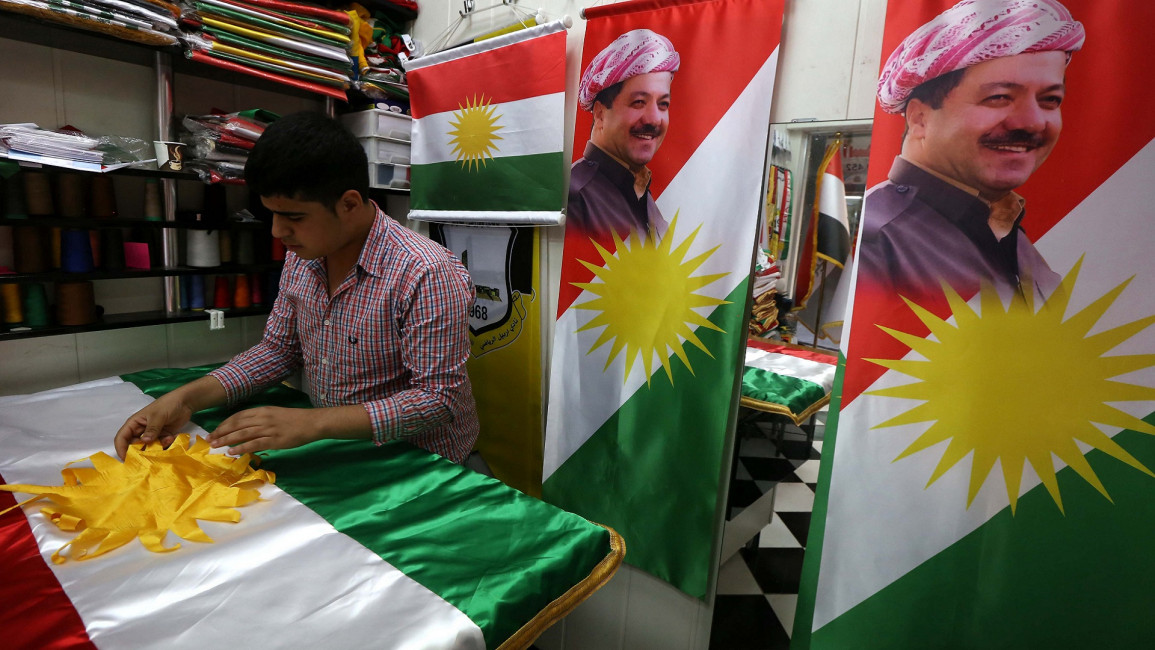
The Geneva talks and the Kurdish national project
UN envoy Staffan de Mistura has announced a "temporary pause" in the Syria peace talks held in Geneva.
The talks are on hold until Febuary 25. While there are few expectations of consequential results as an outcome of the talks in the absence of direct negotiations, the conference has at least defined the key players that are to take part in pursuing an agreement that ends the Syrian civil war and moves the country towards a pluralistic state.
It comes as no surprise that the Kurdish representation is lacking as a result of Turkey's refusal to accept Kurdish involvement. This raises questions with regards to the status of the Kurdish nationalist project, for while the Democratic Union Party (PYD) is not participating in the negotiations, its significant presence on Syrian ground indicates the necessity of a future role.
 |
Perhaps the Kurdish aspiration to secession is historically closest to fruition today |  |
The modern promise
Though Kurdish nationalist sentiments have their roots in 19th century developments that triggered the propagation of several nationalist projects in the region, the possibility seemed more likely following the Treaty of Sevre in 1920.
After the First World War, the treaty declared a plan to establish the state of Kurdistan. The Treaty of Sevre was soon superseded by the Treaty of Lausanne a few years later, in which Kurdish territory was divided between Turkey, Iran, Iraq and Syria.
Perhaps the Kurdish aspiration to secession is historically closest to fruition today. In fact, Iraqi Kurdistan has enjoyed autonomy for more than a decade following the occupation of Iraq.
In 2003, Kurdish forces saw an opportunity to further entrench their autonomy through establishing a relatively secure area in comparison with the rest of Iraq. Though northern Iraq was only one of the many regions to be included in the long-sought-after independent Kurdistan, it seemed to initiate a move towards independence that could be achieved upon the collapse of a central government.
This has culminated in the president of Iraqi Kurdistan Massoud Barzani's recent call for redrawing the borders of the Middle East and establishing a Kurdish state.
Moreover, Kurdish-controlled territory in Iraq continues to expand with the liberation of IS-controlled areas. The latest example of this being the town of Sinjar, which has sparked controversy over what appears to be the Peshmerga's organised destruction of Arab towns.
IS' role, however, in marking the Kurdish borders was not only limited to Iraq, but extended to Syria, with the PYD gaining relative autonomy in Kurdish regions since the beginning of the conflict.
The PYD has also retained its own political agenda, for while it has played a major role in battling IS, there have been sporadic clashes with regime forces as well.
Yet progress in Kurdish statehood still faces a number of hurdles on the political front.
International recognition
The absence of any Kurdish representation in the Geneva negotiations serves the purpose of continuing to delay the question of the status of the Kurdish regions. Such a delay is likely to last for some time - given the threat IS poses and the lack of a foreseeable resolution for the Syrian war.
 |
Taking part in the Geneva conference would have been a chance for Kurds to win international acknowledgment |  |
The YPG aims to replicate the Iraqi model, with the establishment of a war-free Kurdish region in Syria. This attempt, nevertheless, appears to be hindered by several factors.
On the one hand, the pressure Turkey exercised to exclude Kurdish involvement was aimed at stifling the opportunity for giving legitimacy to Kurdish demands of autonomy within Syrian territory.
Taking part in the Geneva conference would have been a chance for Kurds to win international acknowledgment at a time when they appear to be in a strong position to negotiate for a major role in any Syrian resolution.
In addition, participating in the Geneva talks would have also constituted de-facto recognition of the role of PKK-linked groups. The US maintains its commitment to labelling the PKK as a terrorist group that threatens Turkish stability, while regarding the YPG as an ally involved in the battle against IS.
This has not been the Turkish stance, however. President Erdogan continues to consider the YPG as merely an extension of the outlawed PKK. This, of course, explains Russia's enthusiasm for Kurdish involvement in the peace talks, especially with the strained relations between Russia and Turkey.
| Read more on the Russia-Turkey crisis over Syria |
| - NATO calls extraordinary meeting after Turkey downs Russian jet - Russia jet in Turkish airspace 'was not the first' - What was Russia's airforce doing near Turkey's borders anyway? - Who are the Turkmen? - Comment: Showdown on the Syrian border |
On the other hand, internal tensions also afflict Kurdish politics.
Whereas the conflicts in Iraqi Kurdistan have been for the most part resolved over the past decade, qualms over PKK methods persist. A few months earlier, such disagreements had resulted in Barzani's demand that the PKK leave Iraq, while justifying Turkey's airstrikes on PKK bases in the Kuridsh region of Iraq.
These difficulties have meant that it would be far-fetched, to say the least, to expect much in the way of international recognition for Kurdish autonomy in the near future.
But in the absence of stability within Syria, the PYD's prospects for reproducing the Iraqi Kurdish scenario remain substantial.
Karim Barakat is an instructor of philosophy in the American University of Beirut.
Opinions expressed in this article remain those of the author and do not necessarily represent those of al-Araby al-Jadeed, its editorial board or staff.




